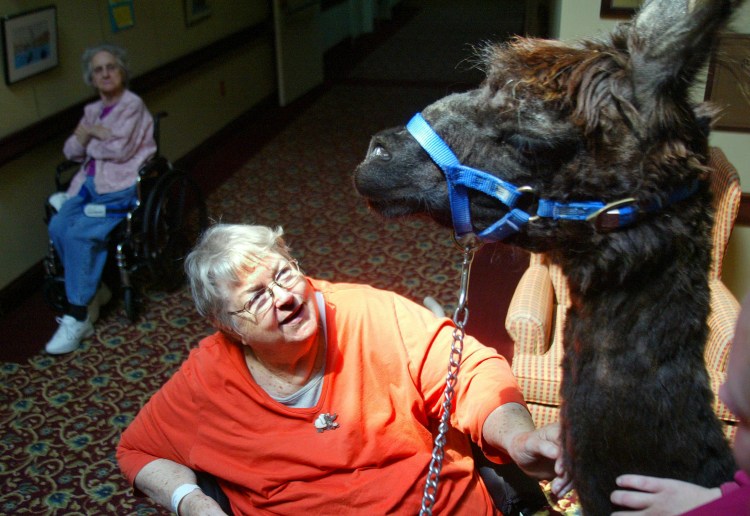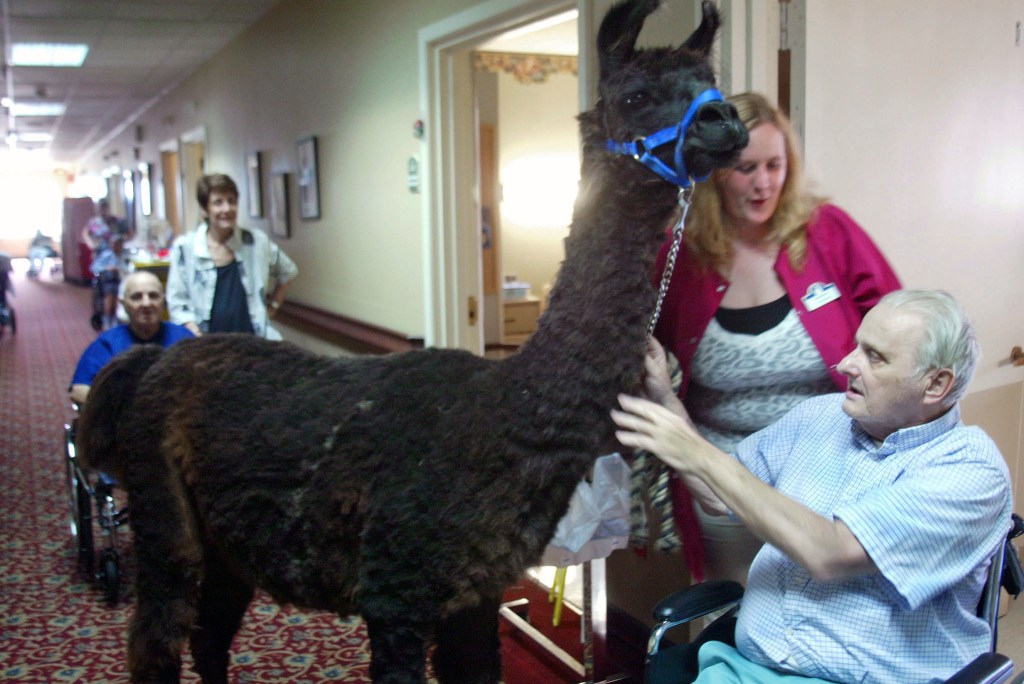LITTLETON, Mass. — At the Life Care Center of Nashoba Valley, it’s not uncommon to see patients asleep in their wheelchairs by the saltwater-fish tank or out for a stroll around a pasture filled with grazing animals like goats and llamas.
Director Ellen Levinson said while the merits of “pet therapy” have been adopted and used at various skilled nursing facilities across the country, it’s rare to find chickens and alpacas at a site.
At the 120-bed nursing home, which houses a specialized memory-support unit for those with severe dementia and other conditions that affect the memory, staff members make time to ensure their patients interact with the animals whenever possible.
“This is my philosophy: A lot of places say, ‘We have pet therapy,’ and what they have is someone who brings a dog in on a leash once a week,” she said. “If I were living here, that would make me more miserable. It’s not like real life. It’s not like having a dog, and then you’re just tempted with what you could have all the time.”
Levinson developed animal therapy and even “llama psychology” further at her facility to bring brightness to patients’ days. Levinson, an animal lover, launched the program, which now has fish, an alpaca, dogs and goats, but it initially started out with just her own pet golden retrievers. She now has staff once in a while walk one good-natured llama named Travis through the building for a treat.
The local Life Care Center, run through the national group Life Care Centers of America, with 200 facilities across the country, has a policy to resort rarely to medications for unruly residents.
Levinson said she can’t attribute all of her staff’s success to the presence of animals, but she says they help.
“I wouldn’t attribute it directly to the animals, but to the idea there are ways to make life pleasant beyond just giving (the residents) a pill,” she said. “A pill is a very last resort. That’s why we sit out on the porch with them, instead of saying we’re too busy. I tell staff, you have to find time.”
This spring, the Life Care Center of Nashoba Valley was awarded a perfect score by the state Department of Public Health in a survey of nursing homes and senior-care providers.
Levinson said the animals help make the facility more enjoyable and help visiting family members feel more at ease, giving them a chance to talk about something other than sickness and health in a medical setting.
Program Director Erica Labb, who oversees the floor, said residents of all ages come into the Life Care Center with family members who haven’t prepared for this stage. Levinson said that’s why she encourages family members visiting, and even her staff to get better prepared for the end while they’re here.
According to Kaiser Health News, in 2011, Medicare spending reached close to $554 billion, which amounted to 21 percent of the total spent on U.S. health care in that year. Of that $554 billion, Medicare spent 28 percent, or about $170 billion, on patients’ last six months of life.
Levinson said some people as young as 55 develop dementia or other memory-based diseases like Alzheimer’s, and it’s never too early to prepare for that stage. She said almost half the time, she finds patients who don’t have a health care proxy designated or a listing of what they want at the end of life.
“People avoid those discussions,” she said. “Our enthusiasm stems from this. … (Family will) say, ‘I have no idea what Mom would have wanted.’ (We say) ‘How sad. You could have.’ ”
At the Life Care Center, though, Levinson said her facility adopts a pro-animal policy to make a stay in Littleton as pleasant as possible.
In the memory-support room, next to a hand-painted mural on the wall of an underwater ocean scene, about 30 people recently sat quietly. Some knitted. Others stared out the window, toward a chicken coop – the latest addition to the facility’s animal kingdom.
“The idea for the chickens is that people who have mild, midstage dementia to late-stage, are too agitated and distracted to sit still and do a craft project or a word game or listen to a music program,” Levinson said.
“(With the animals), there’s always something to look at, and it’s life that they’re looking at.”
Copy the Story LinkSend questions/comments to the editors.




Success. Please wait for the page to reload. If the page does not reload within 5 seconds, please refresh the page.
Enter your email and password to access comments.
Hi, to comment on stories you must . This profile is in addition to your subscription and website login.
Already have a commenting profile? .
Invalid username/password.
Please check your email to confirm and complete your registration.
Only subscribers are eligible to post comments. Please subscribe or login first for digital access. Here’s why.
Use the form below to reset your password. When you've submitted your account email, we will send an email with a reset code.